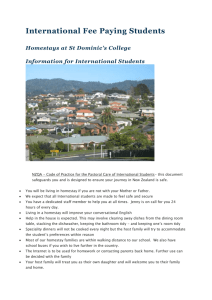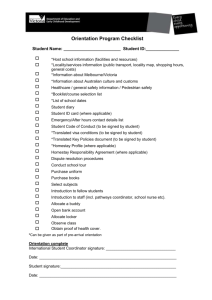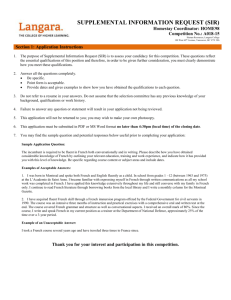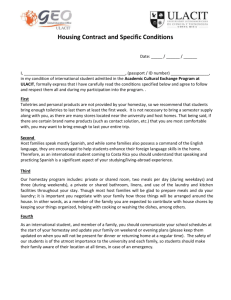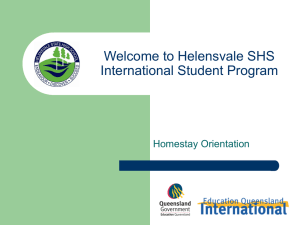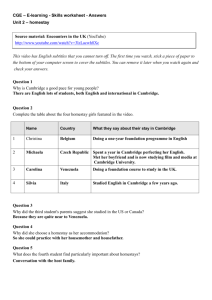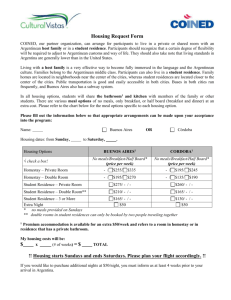Guidelines for participants in the Homestay Program for International
advertisement
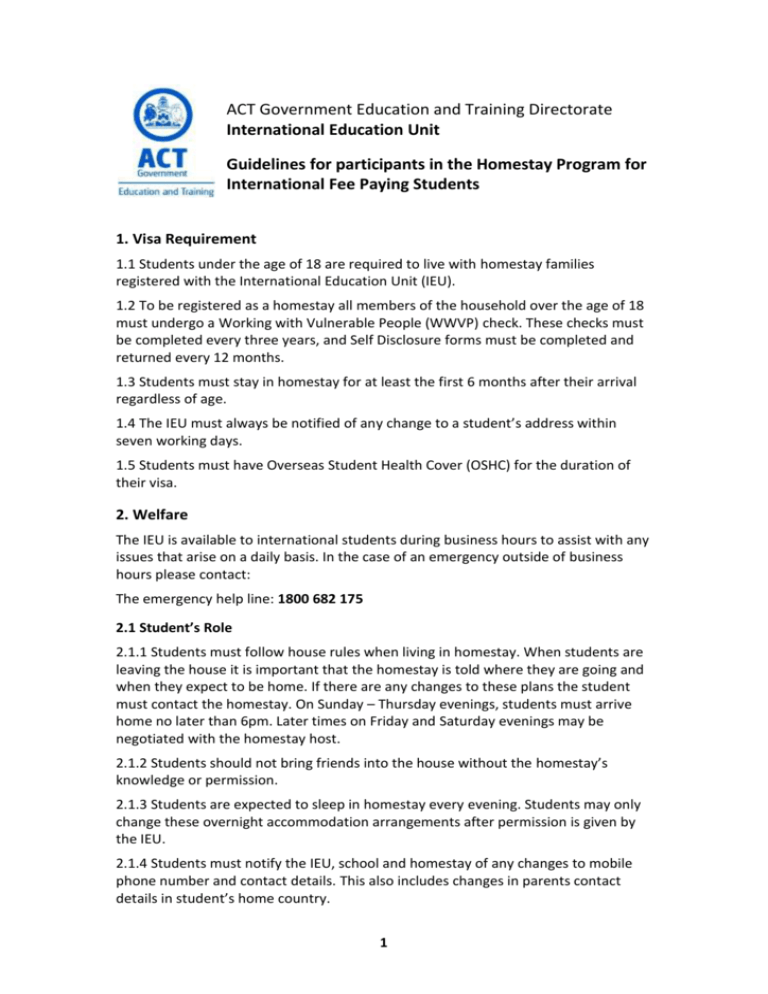
ACT Government Education and Training Directorate International Education Unit Guidelines for participants in the Homestay Program for International Fee Paying Students 1. Visa Requirement 1.1 Students under the age of 18 are required to live with homestay families registered with the International Education Unit (IEU). 1.2 To be registered as a homestay all members of the household over the age of 18 must undergo a Working with Vulnerable People (WWVP) check. These checks must be completed every three years, and Self Disclosure forms must be completed and returned every 12 months. 1.3 Students must stay in homestay for at least the first 6 months after their arrival regardless of age. 1.4 The IEU must always be notified of any change to a student’s address within seven working days. 1.5 Students must have Overseas Student Health Cover (OSHC) for the duration of their visa. 2. Welfare The IEU is available to international students during business hours to assist with any issues that arise on a daily basis. In the case of an emergency outside of business hours please contact: The emergency help line: 1800 682 175 2.1 Student’s Role 2.1.1 Students must follow house rules when living in homestay. When students are leaving the house it is important that the homestay is told where they are going and when they expect to be home. If there are any changes to these plans the student must contact the homestay. On Sunday – Thursday evenings, students must arrive home no later than 6pm. Later times on Friday and Saturday evenings may be negotiated with the homestay host. 2.1.2 Students should not bring friends into the house without the homestay’s knowledge or permission. 2.1.3 Students are expected to sleep in homestay every evening. Students may only change these overnight accommodation arrangements after permission is given by the IEU. 2.1.4 Students must notify the IEU, school and homestay of any changes to mobile phone number and contact details. This also includes changes in parents contact details in student’s home country. 1 2.1.5 For students under the age of 18, travel outside the ACT is not permitted unless accompanied by an adult over 21 years of age. Permission must be given by the parents and the IEU, and a ‘Permission to Travel Outside the ACT’ form must be completed. Students can ask the International Private Student (IPS) Coordinator at their school for a copy of this form. 2.1.6 The IEU considers homestay the most appropriate place for a student to be living. However, once students have turned 18 and been in homestay for at least six months, students can apply to move out of homestay. Students will need to contact the IEU or their IPS Coordinator to obtain and complete an ‘Application for Independent Living’ form. This must be completed and approved before moving out of homestay. 2.2 Homestay Role 2.2.1 According to the ESOS (Education Services for Overseas Students) legislative framework which providers, international students and homestay hosts must follow, it is now mandatory for homestay host families to attend one training session per year. 2.2.2 Homestay parents will need some knowledge and understanding of the needs of young adolescents, a realistic expectation of cultural, linguistic and religious differences and an awareness of the emotional needs of young people who are away from their home environment. 2.2.3 A stable living environment with an Australian family plays a very important part in helping students to adapt to Australian society and improve their English. 2.2.4 Homestay parents will be able to perform “in loco parentis” functions such as signing permission notes. It is not reasonable for a homestay to be asked to sign absence notes unless they are aware of the circumstances. Any absence notes for sickness should be accompanied by a medical certificate. 2.2.5 Students are expected to sleep in homestay every evening. Students may only change these overnight accommodation arrangements after permission is given by the IEU. 2.2.6 Homestay parents are to accompany their student to school on the next day after their arrival. The school will have enrolment forms for the homestay to complete. 2.2.7 Homestay parents must make suitable arrangements for the student returning home after their first day of school. It will be necessary to orient students to the Canberra bus system, especially with regards to getting to and from school. 2.2.8 Homestay parents should demonstrate a firm but flexible approach to matters of welfare, discipline, house rules, meals and cooperative living. House rules and expectations should be clearly explained to the student upon arrival. It is highly recommended that the student is given a written version of these. 2.2.9 It is not permitted for student’s parents and extended families to reside in homestay accommodation on the student’s initial arrival in Canberra. It is vital that the homestay host family and the student be given the time and space required to ensure a successful transition without the pressure added by the presence of parents 2 in the house affecting the long term relationship. The IEU will ensure that student’s parents understand that a homestays home is not a hotel. After the student has been in homestay accommodation for six months, homestay hosts are very welcome to host student’s families should they wish. 2.2.10 The IEU and the school must be notified of any changes to: Members of the household WWVP checks will need to be completed Students and their families need to be informed IEU and school documentation needs to be updated Contact details All work, home and mobile phone numbers must be kept current Homestay student Students must stay in homestay accommodation until they turn 18 years of age, or for at least six months. Students must have a completed an ‘Application for Independent Living’ form that includes a signature from their parents acknowledging their approval for their child to move out of homestay. The IEU and school must know the student’s address at all times. As a homestay host, it is your responsibility to ensure that wherever possible, holidays should not be taken during school term times. Exceptions will be made for unexpected emergencies that may occur. 2.3 Resolution 2.3.1 No arrangements for changing homestay are to be made between a homestay and student. All such requests should be referred to the IEU. 2.3.2 Students and homestay families should contact the Homestay Coordinator on 62059194 if there are any concerns that arise. The Homestay Coordinator will then contact both the homestay and the student to discuss these issues. The IEU recommends that any misunderstandings or miscommunications are addressed immediately to avoid escalation. 2.3.3 If an issue arises the homestay should: Discuss the matter with the student. If the problem cannot be resolved, or the homestay host feels they do not have the appropriate cultural/language understanding to resolve the situation, they should contact the Homestay Coordinator on 62059194. 2.3.4 If an issue arises at school: Schools may contact the homestay from time to time to discuss or clarify absences. Any other school issues, or serious absence concerns, should be referred to the IEU. 2.4 Medical Issues 2.4.1 Prior to student arrival the IEU arranges Overseas Student Health Cover (OSHC), provided by OSHC Worldcare. Students will receive an OSHC card on arrival. 3 2.4.2 If a student becomes ill and requires medical care, the homestay hosts are required to arrange medical appointments. The full fee will be paid to the doctor at the time of consultation and reimbursement can then be applied for through OSHC Worldcare. The refund can be accessed over the internet or with the claim forms provided in the student welcome package. If extra assistance is required the IPS Coordinator at the school will assist. 2.4.3 If an ambulance is required, or it is necessary to visit the hospital in an emergency situation, the hospital will require OSHC details. The IEU must be contacted immediately if such a situation arises. 2.5 Meals 2.5.1 The homestay family will supply breakfast, lunch and dinner. After the first six months in homestay accommodation, students have the option of five weekday lunches not included. In this case, students will be expected to purchase their own lunch and daytime snacks on these five days. 2.5.2 A typical breakfast usually includes juice, cereal, milk, toast, jam, tea or coffee. Lunch is usually a sandwich and fruit. Dinner is normally a cooked meal. 2.5.3 It is important for students to discuss the food they like to eat with the homestay family. Homestay host’s will expect students to indicate if they do not like various foods, and provided this is done politely, the homestay host will appreciate openness and honesty. 2.5.4 Students and homestay families are expected to share the evening meal together, as this is the ideal opportunity for English conversation and building relationships. Students must let the homestay family know if they are running late or if they will not be coming home for a meal over the weekend. This should be done well in advance of the meal being prepared. 2.5.5 Snacks between meals need to be negotiated between the student and the homestay family. Students should not take food or drink from the homestay family without their consent. Students must not eat or drink in their bedrooms and should discuss with their homestay family in which rooms food is allowed to be eaten. 3. Accommodation 3.1 Requirements 3.1.1 Students will be supplied with: a single bedroom, with bed, bed linen and blankets beds must have mattress protectors a desk/study area with chair adequate light for studying adequate heating in the student's room a cupboard suitable for storing clothes 3.1.2 New Australian Government School International Homestay Standards were implemented in 2014. Carpets must be clean, rooms repainted when required; window covers clean and intact and all bedroom furnishings must be clean and in 4 good working order. The Homestay Coordinator will view each room on inspection and advise of any repairs/cleaning that is required. 3.1.3 The student must be given a key to the home. It is the student’s responsibility to keep the key in a safe place so that it is not misplaced. If the key is lost then students are liable for rekeying the entire house for security purposes. 3.1.4 Male and female international students must not reside in the same homestay. Exceptions may be made for siblings and other related students (e.g. cousins) if requested by the students’ parents and pending availability. 3.1.5 Students must not be accommodated in the home of any staff working at the school they attend. 3.2 Student’s Role 3.2.1 Students are expected to share household chores as is customary in Australian families. Students will be expected to keep their rooms tidy and clean the kitchen and bathroom/toilet after use. The homestay should make their expectations clear to the student, including demonstrating the use of the vacuum cleaner, the dishwasher and how to complete simple tasks like making the bed. 3.2.2 Valuables, such as large sums of money or jewellery, should not be left in the bedroom. Students should make use of their student bank accounts and only withdraw small amounts of money at any given time. 3.2.3 If any damage is caused, the student must advise the homestay immediately. 3.3 Homestay Role 3.3.1 The homestay will discuss with the student the families’ routine around the washing and ironing of clothes. 3.3.2 The homestay will outline clearly which electrical equipment may be used by the student such as the television, computer, stereo, and any restrictions on their usage. 3.3.3 Many students will lack experience in doing household chores. It is reasonable to expect that students will keep their rooms tidy and clean and the kitchen and bathroom/toilet after use. The homestay should make their expectations clear to the student, including demonstrating the use of the vacuum cleaner, the dishwasher and how to complete simple tasks like making the bed. 3.3.4 Any damage should be reported immediately to the IEU in writing outlining the circumstances leading to the cause of any damage. Homestay hosts must not negotiate with students regarding payment for alleged damage and no money should be withheld from students for cleaning or repairs. The IEU will determine remuneration where appropriate. Homestay host families must ensure that their house and contents are adequately insured. If an item is damaged and a replacement is required, the Homestay Coordinator will determine the appropriate compensation based on the condition and age of the item. For major damage, the student will pay the insurance excess for any claim. 5 4. Fees 4.1 To be paid 2 weeks in advance. Students have the option of: $280.00 per week, full board, three meals per day and snacks. OR $260.00 per week, 5 weekday lunches and daytime snacks not included. (Please note: this option is NOT available to students until after they have been enrolled in an ACT public school for at least six months) Deposit of $560.00 to be used only as payment for the last two weeks homestay fees, this is not a bond and cannot be retained for any damage. First payment of $1120.00 to be paid upon arrival, this includes the deposit and two weeks homestay fees. (Please write separate receipts for the deposit and the first two weeks homestay fees) Second payment of $560.00 to be paid at the end of the second full week in homestay accommodation. Payments will continue on a fortnightly basis until approval is given by the IEU to move out of homestay accommodation. Two weeks’ notice must be given by either party for the student to move out. The following charges will apply when the student is away from their homestay: Holiday Room-Holding Fee Anytime a student is away from the homestay for more than 7 days for all holiday periods. If a student is away less than 7 days, the full rate will apply. Short Term Placement Student belongings left in bedroom and room is not used. $50 per week while absent, paid before departure. $40 per night is payable 4.2 Student’s Role 4.2.1 Students must pay homestay fees every two weeks. Students should keep a calendar or set up a reminder to ensure that payment is never late. 4.2.2 Students must not pay their homestay any more than the fortnightly amount, except for the initial payment which will include the deposit. 4.2.3 Students must make sure they receive and keep receipts for all homestay payments. 4.2.4 If students do not give the required two weeks’ notice, the deposit will not be returned. 4.2.5 If a student is asked to leave the homestay without two weeks’ notice due to misbehaviour, or has to leave Canberra due to a breach in their student visa conditions, the deposit will not be returned. 6 4.3 Homestay Role 4.3.1 The homestay must give the student a receipt for payment indicating the period for which the payment has been made. In the case of payment disputes the IEU will request receipts. 4.3.2 Any variation to the amount or frequency of student homestay payments is not permissible. 4.3.3 The deposit cannot be withheld for any reason other than payment of the last two weeks homestay fees. Should a homestay host be unable to give two weeks’ notice then the homestay is required to return the deposit in full. The amount of the deposit must be calculated using the initial payment made by the student upon arrival. 5. Internet and Phone 5.1 Internet 5.1.1 All students must purchase their own wireless broadband USB modem and ensure the usage is pre paid. Students must not access or share homestay internet facilities. 5.1.2 Students must not enter into any contracts or plans with internet providers but purchase prepaid only. These can be purchased through most mobile phone companies. Homestay hosts should assist students to purchase wireless broadband USB to ensure that the company has coverage in their particular suburb. Alternatively, students can purchase mobile phone data and access the internet on their electronic devices via their phone hotspot. 5.1.3 Under no circumstances should homestay hosts and students be sharing internet costs. 5.2 Phone 5.2.1 Use of the telephone for incoming calls at a reasonable time of the day should be allowed. Students must ensure that they are only making and receiving mobile phone calls prior to 10pm. 5.2.2 When permission is asked, reasonable access must be given to the student in order to make phone calls from the landline. Students should purchase international telephone cards to ensure that a local call is the maximum cost borne by the homestay. 5.2.3 Students are required to pay for all national and international phone calls they make. Itemised phone bills provide an accurate record of telephone use. 7
